The EntireX XML/SOAP Wrapper enables XML-based communication to EntireX/Natural RPC servers and communication from EntireX/Natural RPC clients to XML-based servers.
This document covers the following topics:
The EntireX XML/SOAP Wrapper and the XML/SOAP RPC Server enable XML-based communication via XML/SOAP Wrapper. An EntireX RPC server or a Natural RPC Server can communicate with XML-based clients. Similarly, an EntireX RPC client or Natural RPC client can communicate with an XML-based server via XML/SOAP RPC Server. EntireX participants (client or server) with an XML-based application (server or client) can be easily integrated with the EntireX Workbench and the EntireX XML/SOAP Wrapper/ XML/SOAP RPC Server.
The XML Mapping File is an XML file (file extension .xmm) generated by the EntireX XML Mapping Editor and used by the EntireX XML/SOAP Runtime, to map between XML documents and EntireX/Natural RPC parameters.
Communication is synchronous.
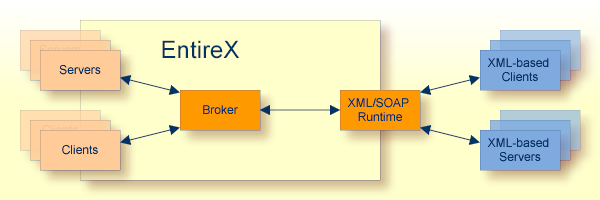
The XML-based client sends an XML document to EntireX XML/SOAP Runtime.
From an incoming XML document, the EntireX XML/SOAP Runtime extracts (using the mapping file) the information necessary to call an EntireX/Natural RPC server. It executes the RPC. The result returned by the EntireX/Natural RPC server is used to create an outgoing XML document.
The XML-based client gets an XML document containing the response.
Mapping example: calc
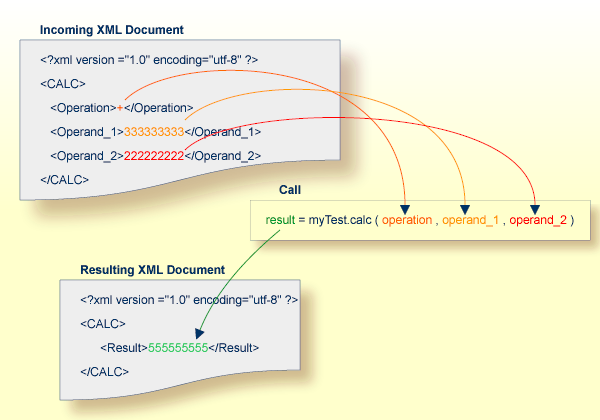
A mapping editor is provided to map the XML structures to those of the server application.
The RPC client sends a request to the XML/SOAP RPC Server. The XML/SOAP RPC Server translates (using the mapping file) the information of an EntireX client call to XML (so it can be understood by an application with an XML interface). The XML/SOAP RPC Server sends the XML document to the XML-based server via HTTP(s) and receives an XML document from the XML-based server. It translates the received XML document and sends the response to the RPC client.
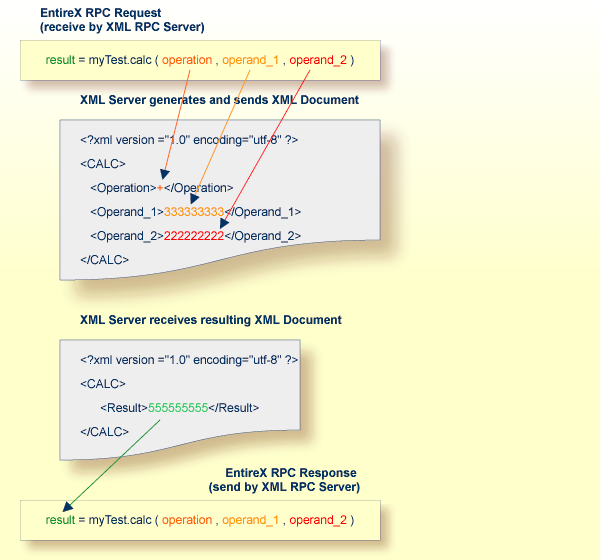
During the development process, users map XML document structures to RPC parameters and vice versa, and generate the XMM (XML Mapping) File.
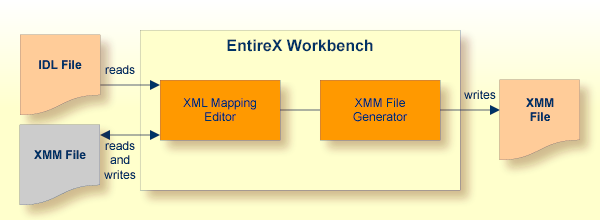
The input for the XML Mapping Editor is an existing Software AG IDL file. See XML Mapping Editor.
The XML Mapping Editor allows users to map the structure of an incoming XML document to the incoming parameters (IN, INOUT) of an Natural RPC Server and the parameters returned by the EntireX/Natural RPC server (OUT, INOUT) to the structure of the outgoing XML document.
To ease the development process, standard mappings can be created automatically. These can be modified and adapted.
Supported standard mappings are:
element-oriented mapping
attribute-oriented mapping
SOAP-conformant mapping
After the mapping process, the following runtime components can be generated:
XML Mapping Files
are used during runtime to map between the XML documents and the
EntireX/Natural RPC parameters.
The EntireX XML/SOAP Runtime enables XML-based clients to communicate with an EntireX/Natural RPC Server; and it enables EntireX RPC clients to communicate with applications that have an XML or SOAP interface (via XML/SOAP Runtime).
The incoming XML document is mapped by the generated XMM file to the EntireX/Natural RPC parameters, using the mapping files created during the development process. From the parameters returned by the EntireX/Natural RPC server, the generated XMM file creates the outgoing XML document, using the corresponding mapping files.
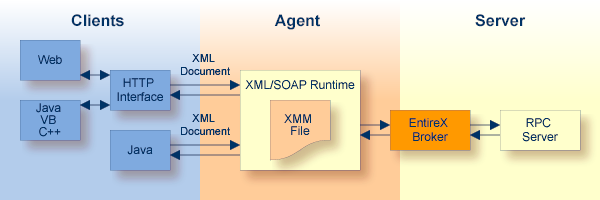
The XML/SOAP Runtime provides two client-side interfaces:
A Java interface
The Java interface can be used by Java clients. See Client Using the Java Interface.
An HTTP interface
The HTTP interface supports HTTP Post Request and HTTP Get Request.
See The HTTP Interface.
To make it possible to call the XML/SOAP Runtime from within a Web server, see XML/SOAP Listener.
The XML/SOAP Runtime can connect EntireX clients to applications that have an XML or SOAP interface, for example SAP or PeopleSoft. These applications are then the XML server. Example: An EntireX client requests information of an SAP application. The request is sent to the EntireX Broker and the EntireX XML/SOAP Runtime (translated to XML there) and then to the SAP XML interface, processed by the SAP application. The response is returned the same way.
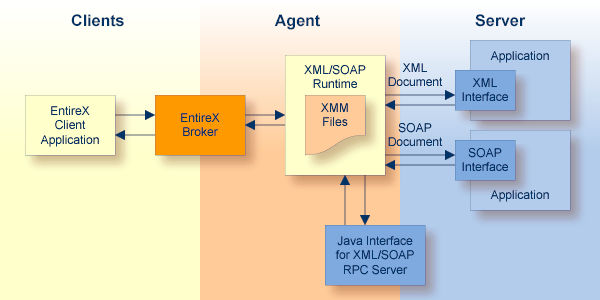
The XML/SOAP Runtime provides two server-side interfaces:
A Java interface
The Java interface can be used to modify the document and determine
further processing.
An HTTP interface
The XML/SOAP document is sent to the specified target.
Client sends and receives data as an XML or SOAP document.
Server receives and sends data as an XML or SOAP document (for example a Web service).
The XML/SOAP RPC Server allows RPC clients to communicate with target servers via HTTP(S). The XML/SOAP RPC Server transforms RPC client calls into XML/SOAP calls. It works together with the XML/SOAP Wrapper.
The EntireX XML/SOAP Runtime enables XML-based clients to communicate with an EntireX/Natural RPC Server; and it enables EntireX RPC clients to communicate with applications that have an XML or SOAP interface (via XML/SOAP Runtime).
The EntireX XML/SOAP Wrapper enables XML-based communication to EntireX/Natural RPC servers and communication from EntireX/Natural RPC clients to XML-based servers.
The XML Mapping File is an XML file (file extension .xmm) generated by the EntireX XML Mapping Editor and used by the EntireX XML/SOAP Runtime, to map between XML documents and EntireX/Natural RPC parameters.